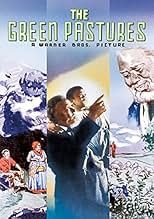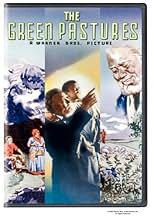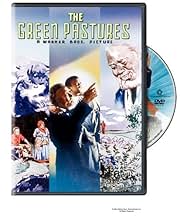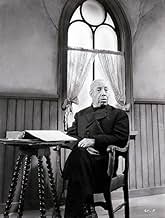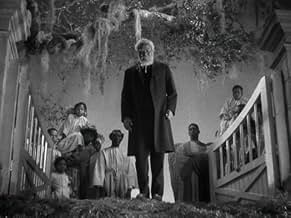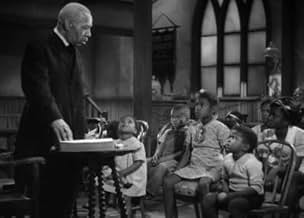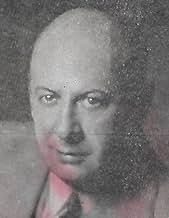Aggiungi una trama nella tua linguaGod, heaven, and several Old Testament stories, including the Creation and Noah's Ark, are described supposedly using the perspective of rural, black Americans.God, heaven, and several Old Testament stories, including the Creation and Noah's Ark, are described supposedly using the perspective of rural, black Americans.God, heaven, and several Old Testament stories, including the Creation and Noah's Ark, are described supposedly using the perspective of rural, black Americans.
- Regia
- Sceneggiatura
- Star
- Premi
- 4 vittorie totali
Eddie 'Rochester' Anderson
- Noah
- (as Eddie Anderson)
Frank H. Wilson
- Moses
- (as Frank Wilson)
Edna Mae Harris
- Zeba
- (as Edna M. Harris)
Charles Andrews
- Flatfoot
- (as Chas. Andrews)
Billy Cumby
- Abraham
- (as William Cumby)
- …
Recensioni in evidenza
Before I get into the film itself, here's the little known back-story. Roark Bradford, a white Tennesseean, was mesmerized as a boy by the sermons of a black preacher named John Wesley Henning (aka "Preacher Wes). Rev. Henning entertained and educated his audiences with imaginative biblical tales done in a fashion in which his rural black audiences could relate. Years later in 1928, Henning's twists on biblical tales were the basis of Bradford's book "Ol Man Adam and His Chillun." Marc Connely enjoyed the book, and the result was the play and film "The Green Pastures." The film and play adds the charming frame device of Mr. Deeshay, a black Sunday school teacher telling the Biblical tales from Bradford's text with Noah, Adam. Moses, et.al. as Southern rural blacks. Much has been said about the dialect and stereotypes. Fact is, the dialect is pretty close to the truth of this time and place, as my parents were of that generation (there is a reference to "Sonny Kick Mammy Wine." My parents would make me laugh at their description of a popular moonshine called "Fight Your Mama" that was supposed to have been so potent that it would make the drinker do as the title suggested).
However, the film, as well as much of Bradford's work, is filled with moving truths about the human condition. Witness the dialog between a pre-Rochester Eddie Anderson as Noah and the dignified Rex Ingram as God, as well as the observations about human nature made throughout the film. As for ending, I won't spoil it, but the final scene before the credits says the true message of the film without saying a word. Watch it with an open mind, enjoy, and think.
Incidentally, in 1963, the great comedian Mantan Moreland (who had a bit part as an angel in "The Green Pastures") went back to the source and recorded an album of tales from the source "Ol Man Adam And His Chillun." It's as delightful as the film and along with the original books, make a great addendum to the film.
However, the film, as well as much of Bradford's work, is filled with moving truths about the human condition. Witness the dialog between a pre-Rochester Eddie Anderson as Noah and the dignified Rex Ingram as God, as well as the observations about human nature made throughout the film. As for ending, I won't spoil it, but the final scene before the credits says the true message of the film without saying a word. Watch it with an open mind, enjoy, and think.
Incidentally, in 1963, the great comedian Mantan Moreland (who had a bit part as an angel in "The Green Pastures") went back to the source and recorded an album of tales from the source "Ol Man Adam And His Chillun." It's as delightful as the film and along with the original books, make a great addendum to the film.
Enjoyable movie about a preacher telling his Sunday school class Bible stories about Adam & Eve, Noah, Moses, and more, putting his own distinct spin and flavor on these well-told tales. It's a film that's notable for featuring an all-black cast at a time when such a thing was very uncommon. Today, sadly, the focus for many is on the negatives. Yes, there are stereotypes at play and yes, there's a patronizing tone to the film at times. But rest assured there are no Stepin Fetchits here. One aspect many will flinch at is the stereotyped black voice, which is really more of a white writer's perception of the black voice. That was a common problem back then and, frankly, it often still is today.
Fine performances all around with the great Rex Ingram a standout playing several roles. Special mention to George Reed, an actor who doesn't receive much praise but I've enjoyed him in many films. Some of you might recognize him as Conover from the Dr. Kildare series. Eddie 'Rochester' Anderson also appears as Noah. It's an important movie historically and culturally, not just for African-Americans but for everybody. Quality production with a good script and solid direction. Flawed, yes, but heartwarming entertainment that will put a smile on the face of most discerning viewers.
Fine performances all around with the great Rex Ingram a standout playing several roles. Special mention to George Reed, an actor who doesn't receive much praise but I've enjoyed him in many films. Some of you might recognize him as Conover from the Dr. Kildare series. Eddie 'Rochester' Anderson also appears as Noah. It's an important movie historically and culturally, not just for African-Americans but for everybody. Quality production with a good script and solid direction. Flawed, yes, but heartwarming entertainment that will put a smile on the face of most discerning viewers.
I realize that many modern audiences might be turned off by this film due to the politically correct times we live in--probably moreso for the religious references than for the racial stereotypes. Nonetheless, it's a genuine feel-good movie full of love, kindness, and yes, morality. I'd first read the play for a drama class many years ago, and I was absolutely stunned by it, although I figured that I'd never get to see a production of it. Imagine my delight finding it in the video store and actually taking all of it in. BTW--regarding the racial issues here: it continually amazes me how so many people in the African-American community would find this film and "Song of the South" offensive, yet these same people praise Nelly for "Pimpin'" and Ludicrous touting "Ho's in the bedroom." Maybe I'm missing something here, but I don't like itwhen whites tout ghetto stereotypes, and it's just as offensive to me when blacks do it. Yet, we MUST protect the children from "Green Pastures" and "Song of the South" because they perpetuate "racist stereotypes." Okay, I'm off my soap box--rent this film--it's a masterpiece.
"The Green Pastures" is a far from perfect film and I am pretty sure quite a few folks would be offended by the picture. In fact, the DVD begins with a written disclaimer that explains that the content is offensive when seen today. Obviously, times have changed and the film's patronizing style is out of style in the 21st century--but it's also a film you should see as there really isn't anything like it--even MGM's "Cabin in the Sky". And, in some ways, it's rather beautiful.
The film features an all-black cast--something very unusual for a production from a major studio. It consists of young black children listening to Bible stories and shows the kids' conception of what these events must have been like. The stories are seldom literal--and are quite different from the Biblical originals (such as having only one plague instead of the ten from the story of Moses). But there is also a certain beauty in the stories that show a literal physical God interacting with angels and people on Earth. Sure, it's NOT something that seminary professors would heartily endorse, but the film isn't meant to be literal.
As I said above, the stories are all done with a black cast--even Rex Ingram as God (called 'Da Lawd'). And, although patronizing in style and possessing a few awful stereotypes (such as folks shooting dice), the film is also gentle and good-natured and I assume the film was NOT intended to harm anyone. In other words, the manner is not one to put down black America but perhaps unintentionally minimizes them by often portraying them with a certain child-like innocence. You just have to see it to know what I mean.
So how did this film manage to still get an 8. After all, it surely has a lot of problems! Well, the artistry is the reason. Along with some very nice acting, the film has terrific sets, nice direction and is just lovely. See this one.
The film features an all-black cast--something very unusual for a production from a major studio. It consists of young black children listening to Bible stories and shows the kids' conception of what these events must have been like. The stories are seldom literal--and are quite different from the Biblical originals (such as having only one plague instead of the ten from the story of Moses). But there is also a certain beauty in the stories that show a literal physical God interacting with angels and people on Earth. Sure, it's NOT something that seminary professors would heartily endorse, but the film isn't meant to be literal.
As I said above, the stories are all done with a black cast--even Rex Ingram as God (called 'Da Lawd'). And, although patronizing in style and possessing a few awful stereotypes (such as folks shooting dice), the film is also gentle and good-natured and I assume the film was NOT intended to harm anyone. In other words, the manner is not one to put down black America but perhaps unintentionally minimizes them by often portraying them with a certain child-like innocence. You just have to see it to know what I mean.
So how did this film manage to still get an 8. After all, it surely has a lot of problems! Well, the artistry is the reason. Along with some very nice acting, the film has terrific sets, nice direction and is just lovely. See this one.
10Greg-83
I first saw "The Green Pastures" quite by accident as a 13 year-old while visiting grandparents in Detroit, Michigan many, many years ago...I never forgot it.
Years later, in college, while on a date, I was telling my date about it and we stopped by the school library so I could find a copy of the play to show her...she loved it, too. I've since bought the tape and watch it every now-and-then when I want to smile and feel good.
I remember asking my mom about the movie when I first saw it and always remembered her response..."how do you think the little black children in the movie pictured God and others in the Bible?" And that, of course, is exactly what Marc Connelly was trying to get us to think about.
Though the original play/movie may have met resistance in the South, it was a hit in New York. To the eternal historical revisionists of today who see nothing but stereotypes and negative images, I'd suggest you take another look.
Country folk of the early part of this century did talk with accents and few had much education (whites as well as blacks). The dialog of the film is less a contrived stereotype than it is a snapshot of what the simple life was like. It's not hard for me to imagine a dedicated Mr. Deshee teaching kids in Sunday School about the good book. Nor is it hard to understand why they might picture pharoe's guards in double-breasted suits like the gangsters in the news of their youth, or relating any number of other scenes to what was familiar to them.
Connelly was not trying to convert viewers to religion...he was trying to get those already converted to see the personal relationship with God enjoyed by all his children, regardless of their station in life.
There are no whites in the movie, just as there were no whites in the immediate community where the story takes place. This movie was not made with the burden of every social dilemma we've struggled with over the years. To blindly force modern perceptions and racial baggage on it does nothing but dampen the simple joy of this unique gem.
Years later, in college, while on a date, I was telling my date about it and we stopped by the school library so I could find a copy of the play to show her...she loved it, too. I've since bought the tape and watch it every now-and-then when I want to smile and feel good.
I remember asking my mom about the movie when I first saw it and always remembered her response..."how do you think the little black children in the movie pictured God and others in the Bible?" And that, of course, is exactly what Marc Connelly was trying to get us to think about.
Though the original play/movie may have met resistance in the South, it was a hit in New York. To the eternal historical revisionists of today who see nothing but stereotypes and negative images, I'd suggest you take another look.
Country folk of the early part of this century did talk with accents and few had much education (whites as well as blacks). The dialog of the film is less a contrived stereotype than it is a snapshot of what the simple life was like. It's not hard for me to imagine a dedicated Mr. Deshee teaching kids in Sunday School about the good book. Nor is it hard to understand why they might picture pharoe's guards in double-breasted suits like the gangsters in the news of their youth, or relating any number of other scenes to what was familiar to them.
Connelly was not trying to convert viewers to religion...he was trying to get those already converted to see the personal relationship with God enjoyed by all his children, regardless of their station in life.
There are no whites in the movie, just as there were no whites in the immediate community where the story takes place. This movie was not made with the burden of every social dilemma we've struggled with over the years. To blindly force modern perceptions and racial baggage on it does nothing but dampen the simple joy of this unique gem.
Lo sapevi?
- QuizThe studio's anxiety about this film's all-Black cast is evident in the film's 3:48 minute trailer. It consists of white actor Dick Powell talking directly to the camera, white workers preparing costumes and props, and author Marc Connelly explaining the rationale for the bare sets to a studio executive. According to Connelly, it is how a "simple, devout" people would imagine heaven. At no time are Rex Ingram or any of the film's other stars shown in the preview, and there is only a brief sequence of black extras in a long shot.
- BlooperOne of Noah's son's rides a zebra that is clearly a donkey or mule made to look like a zebra. Two real zebras are loaded while he rides the fake.
- Curiosità sui creditiGod appears in many forms to those who believe in Him. Thousands of Negroes in the Deep South visualize God and Heaven in terms of people and things they know in their everyday life. The Green Pastures is an attempt to portray that humble, reverent conception.
- ConnessioniEdited into Governing Body (2023)
- Colonne sonoreHave You Got Good Religion (Certainly, Lord)
(uncredited)
Traditional spiritual
Performed by the Hall Johnson Choir
I più visti
Accedi per valutare e creare un elenco di titoli salvati per ottenere consigli personalizzati
- How long is The Green Pastures?Powered by Alexa
Dettagli
- Data di uscita
- Paese di origine
- Lingua
- Celebre anche come
- Neger erzählen die Bibel
- Luoghi delle riprese
- Azienda produttrice
- Vedi altri crediti dell’azienda su IMDbPro
- Tempo di esecuzione1 ora 33 minuti
- Colore
- Mix di suoni
- Proporzioni
- 1.37 : 1
Contribuisci a questa pagina
Suggerisci una modifica o aggiungi i contenuti mancanti

Divario superiore
By what name was The Green Pastures (1936) officially released in India in English?
Rispondi

